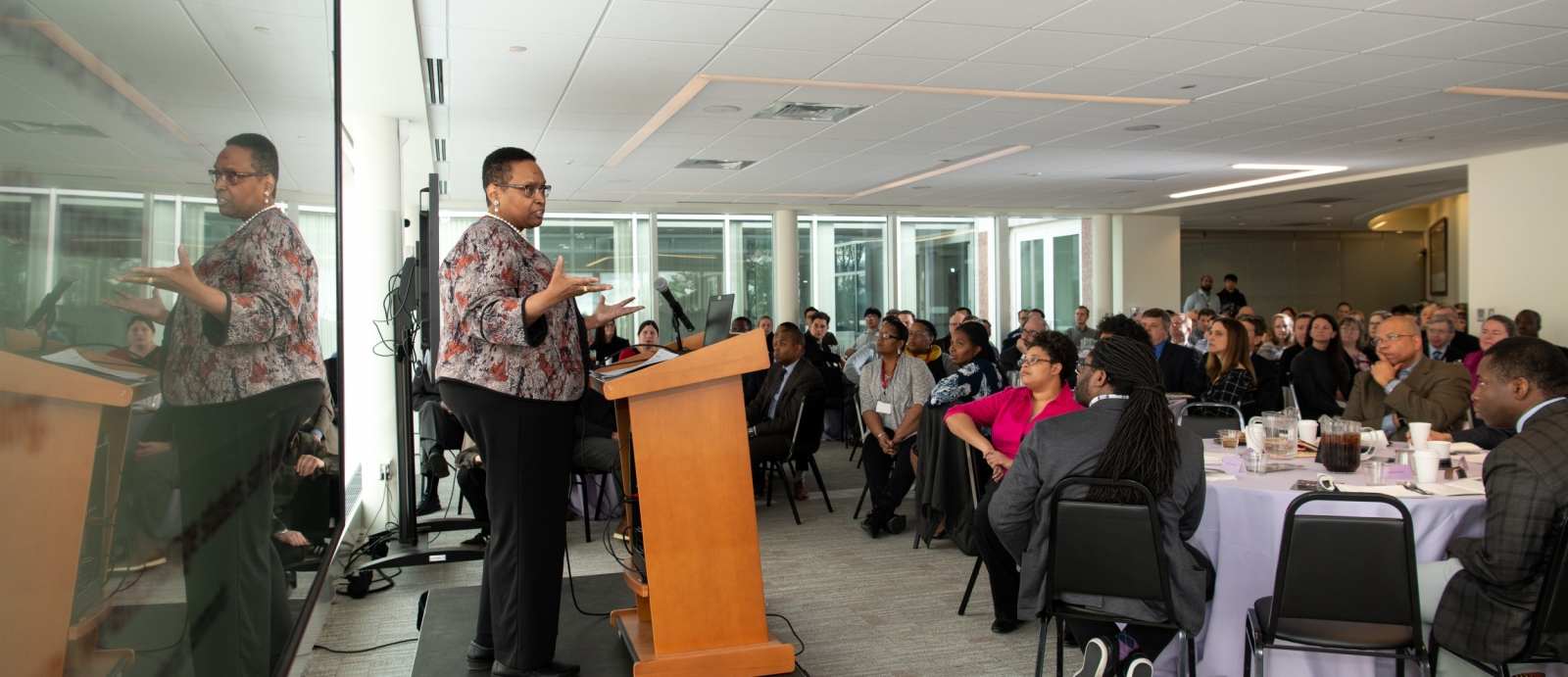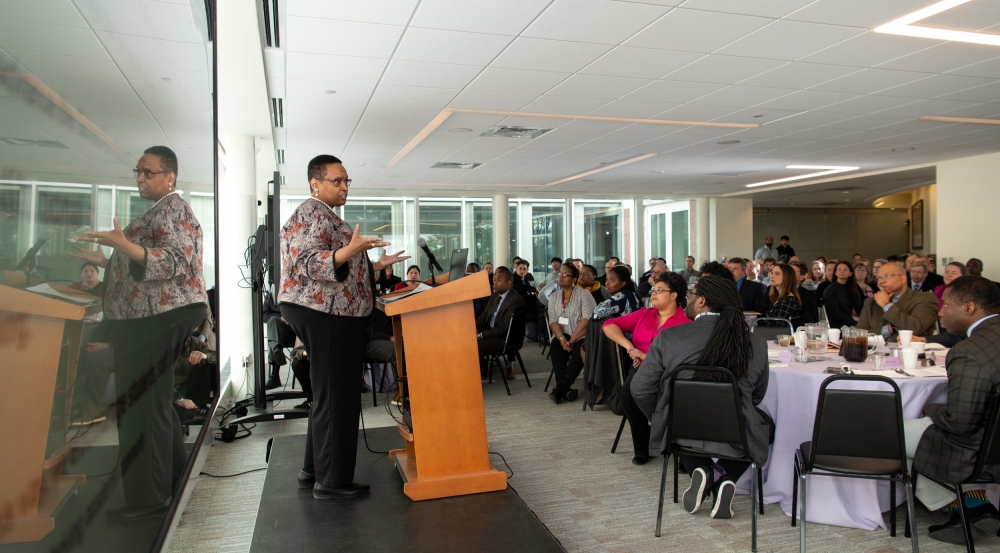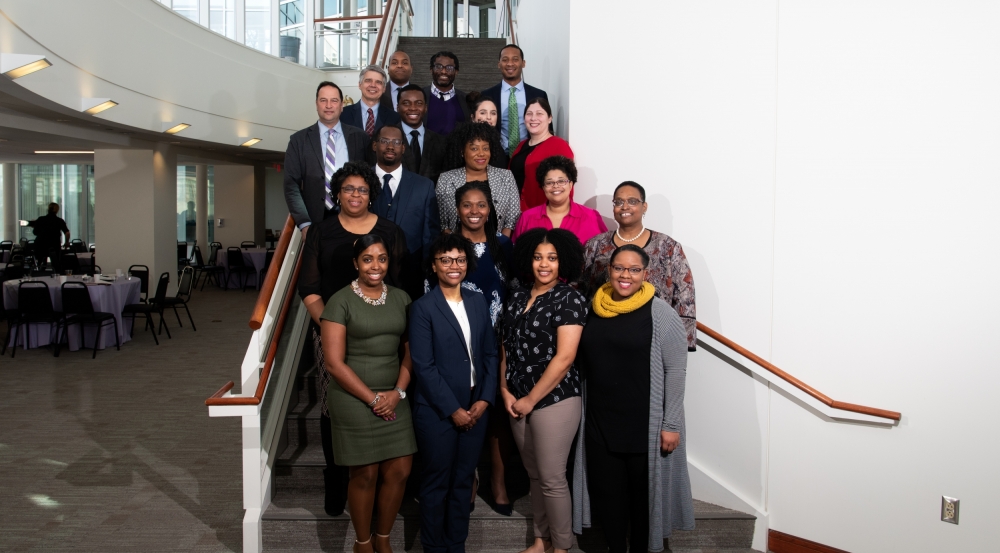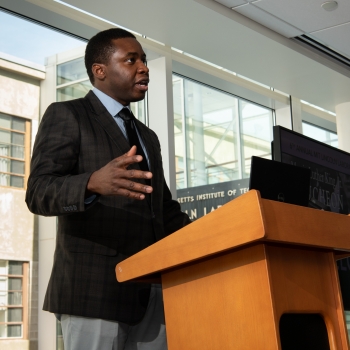
Robbin Chapman speaks at sixth annual Martin Luther King Jr. Luncheon
On March 13, the Lincoln Laboratory community gathered to celebrate the life and work of civil rights activist Martin Luther King Jr. at the sixth annual Lincoln Employees' African-American Network (LEAN) Martin Luther King Jr. Luncheon. The event marked the conclusion of LEAN's month-long celebration of Black History Month, which featured technical presentations from staff and seminars from a variety of guest speakers. This year's keynote speaker was Robbin Chapman, who is the associate dean for diversity, inclusion, and belonging at Harvard Kennedy School.
The theme of the event, Lead, Inspire, Excel: A Call to Service, called upon every person at the Laboratory to inspire the community toward excellence. To express this theme, LEAN invited Chapman to speak about King's legacy and leadership style, his impact upon her life, and strategies to make the Laboratory a more inclusive environment.

"As an MIT alumna, Dr. Chapman has a long-standing relationship with both the Laboratory and the broader Institute. She is extremely accomplished. She is also a technical person of the highest caliber who has dedicated her career to issues of diversity, fairness, equity, inclusion, and belonging," said Melva James, an executive officer of LEAN who works in the Informatics and Decision Support Group. "Dr. Chapman embodies the ideals of leadership, excellence, and service that were featured in our theme this year."
Chapman earned SM and PhD degrees in electrical engineering and computer science from MIT. She has previously held the positions of associate provost and academic director of diversity and inclusion at Harvard Kennedy School, and of associate provost for faculty equity at MIT. In 2016, MIT established the annual Dr. Robbin Chapman Excellence Through Adversity Award to honor an MIT senior who has demonstrated excellence in leadership.
Chapman began her speech by recounting her childhood — growing up as a grandchild of ex-sharecroppers in Virginia, then moving to Brooklyn at a young age. After succeeding academically in high school and as an undergraduate, she was accepted to MIT for graduate education, though she did not know much about MIT at the time. She shared that she likely would not have attended if a mentor hadn't motivated her to do so.
Chapman then discussed the impact that Martin Luther King Jr. and his wife Coretta Scott King had on the civil rights movement in the United States. She highlighted how Scott King was a civil rights activist before her marriage to King, was a full partner in the movement during their marriage, and carried on the work of the movement as a leader after King's death.

"Leadership does not rest on just one person, but is actually distributed across an entire community," Chapman remarked. "This is an important part of the legacy of Martin Luther King Jr."
Chapman then transitioned to speaking about the Laboratory community and described an atmosphere that all organizations should seek to facilitate. The first step begins with access, or allowing any individual to inhabit a shared space. The next step is inclusion, which is acceptance that is dependent upon one's successful conformation to social norms. The last step is belonging, or having one's full, unmodified self-being welcomed in a space.
To follow up on this message, Chapman asked the audience three open-ended statements to consider and discuss with their immediate neighbors: "I feel included at Lincoln Laboratory when…;" "Something Lincoln Laboratory can do to create a more inclusive workplace is…;" and "Something I can do right now to create a more inclusive workplace is…"
Chapman then advised the attendees to THINK before they speak — to ask themselves if their words are true, helpful, inspiring, necessary, and kind. "To take action, it should be personal, engaging, purposeful, correctional, and transformational," she added.
Chapman concluded her keynote address by stressing that individuals at the Laboratory need to use their agency and voice in the present moment to create a more inclusive and just environment. The theme of being an advocate in one-another's lives was prominent in her remarks.
Many Laboratory staff who attended the event were inspired by Chapman's statements. Kendall Weistroffer, staff in the Cyber Operations and Analysis Technology Group, reflected: "Although our paths have converged as Laboratory employees, the routes we have taken to reach this point in our lives differ from person to person. Thus, we must remain grounded in our support of diversity and remember that each of us has a multifaceted background composed of unique challenges and experiences."
After the event, Idahosa Osaretin, LEAN cochair and staff in the Applied Space Systems Group, said, "We hope attendees will relate better with one another and show respect and appreciation for people from different cultures and backgrounds. We should learn to notice when our meeting rooms are devoid of people of a different gender, race, ethnicity, religion, physical ability and disability, and sexual orientation from us."
In the upcoming year, LEAN intends to keep advancing the conversation on diversity, inclusion, and belonging at the Laboratory. Their upcoming events include STEM outreach for underrepresented groups, seminars for technical and personal growth, and summer cookouts to bring members of the Laboratory community together.
